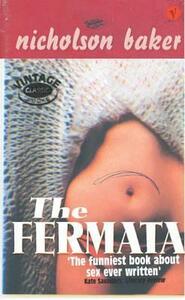Take a photo of a barcode or cover
funny
lighthearted
medium-paced
Plot or Character Driven:
Character
Strong character development:
Complicated
Loveable characters:
No
Flaws of characters a main focus:
Yes
adventurous
funny
reflective
medium-paced
Plot or Character Driven:
Character
Strong character development:
No
Loveable characters:
Complicated
Diverse cast of characters:
No
Flaws of characters a main focus:
Complicated
adventurous
emotional
funny
informative
reflective
tense
medium-paced
Plot or Character Driven:
A mix
Strong character development:
Yes
Loveable characters:
Complicated
Diverse cast of characters:
Yes
Flaws of characters a main focus:
Yes
dark
sad
medium-paced
Plot or Character Driven:
Character
Strong character development:
Yes
Loveable characters:
No
Diverse cast of characters:
No
Flaws of characters a main focus:
Yes
Is it possible to both admire a book and be repulsed by it? In the case of The Fermata, the answer is a resounding yes. The premise here is fascinating: Arno, our anti-hero, has long had the ability to stop time using various convoluted means. The exact mechanics and philosophy behind this are not especially important, and the author gives us a taster of his internal moral dialogue about his actions without getting too deep into it. What matters is what Arno does in his suspended animation, which is exclusively to take women's clothes off. This is discussed at length and the book subsequently digresses further into what is essentially the reproduction of detailed erotica Arno places in the possession of some of his subjects to enjoy seeing them discover and read it. Being a Nicholson Baker book, you can only admire the form of it all – the author lingers over details , savours pieces of language and ideas. There are some masterful paragraphs in this book, as there are in all his work. And yet it's a hard book to defend – Arno's moral ambiguity about his behaviour is fair enough, but you can't help feeling Baker is embarking on a detailed sexual fantasy masquerading as literature, and being a great writer may not quite be enough to get you off that particular charge. Even so, it's a long time since I read anything quite this original, or as strange – both of which are good things.
Once you look past the fact that the main character can stop time, its a very interesting concept.
Nicholson Baker's The Fermata is a strange read . . . awkward and hard-to-categorize, much less review. It's comprised of equal parts literature, science-fiction, romance, comedy, erotica, and memoir.
On the one hand, it absolutely deserves an five-star review for its sheer audacity, innovation, and mastery of language. This is a very clever, beautifully written novel that manages to deliberately meander without boring the reader. It's also a very humorous novel, not so much in a laugh-out-loud sort of way, but one which succeeds in delivering a smile (or more often a smirk) per page. When I allowed myself to become lost in Arno's voice, I quite enjoyed the read, even as I rolled my eyes and scoffed at his good-natured laziness. It's no wonder Baker gets far more attention as a purveyor of literature than as a genre author, but you get the sense that's entirely how he likes it.
Having said all that, this is a book that struggles to earn more than a single-star review for its plotting, pacing, and story-telling. It's is a story comprised of musings, observations, and asides, in which very little happens to advance the plot. Being a fictional memoir does excuse the narrative struggle to some extent, but the 'fictional' element does demand something more. There's a great concept at the heart of the story, with Arno able to freeze time and manipulate those around him, but his own odd sense of morality and decorum won't allow him to exploit it, while his own laziness holds him back from maximizing it. Of course, Arno and his failings are, essentially, the story, so it's hard to find him at fault. Still, it's a read that frustrated me to no extent because it adamantly refused to explore the concept.
Basically, the book comes down to this - Arno longs for women he can never have; freezes time in order to undress or gently molest them; and then restarts time and walks away without the possibility of emotional attachment. It's an interesting concept, and one that's definitely erotic in its application, yet which manages to avoid being obscene in its own cleverness. Arno is so disarming, his efforts come across as innocent and rather naive, good-natured in their thoughtfulness, when in reality they're rather personal assaults upon the women around him.
There's one chapter where he continually stops and starts time, adjusting pornographic images for one woman and adjusting a discreetly place sex-toy for another, which kind of sums up the entire novel. It's weirdly inventive and amusing, but the work required to secretly arouse the two women - with absolutely no payoff for Arno - is so far beyond absurd, it really strains the bounds of credibility.
If you're a fan of literate novels, one who favours concept over content, and one who appreciates narration over narrative, give The Fermata a shot. It is a fun read (taken in small doses) but the novelty does wear thin after a while. On the other hand, if you're at all intrigued by the concept, but (like myself) tend to lean more towards plot and characterization that storytelling showmanship, try giving Dean Koontz's [b:Dragon Tears|32429|Dragon Tears|Dean Koontz|http://photo.goodreads.com/books/1308458435s/32429.jpg|2771826] a read instead.
Originally reviewed at Beauty in Ruins
On the one hand, it absolutely deserves an five-star review for its sheer audacity, innovation, and mastery of language. This is a very clever, beautifully written novel that manages to deliberately meander without boring the reader. It's also a very humorous novel, not so much in a laugh-out-loud sort of way, but one which succeeds in delivering a smile (or more often a smirk) per page. When I allowed myself to become lost in Arno's voice, I quite enjoyed the read, even as I rolled my eyes and scoffed at his good-natured laziness. It's no wonder Baker gets far more attention as a purveyor of literature than as a genre author, but you get the sense that's entirely how he likes it.
Having said all that, this is a book that struggles to earn more than a single-star review for its plotting, pacing, and story-telling. It's is a story comprised of musings, observations, and asides, in which very little happens to advance the plot. Being a fictional memoir does excuse the narrative struggle to some extent, but the 'fictional' element does demand something more. There's a great concept at the heart of the story, with Arno able to freeze time and manipulate those around him, but his own odd sense of morality and decorum won't allow him to exploit it, while his own laziness holds him back from maximizing it. Of course, Arno and his failings are, essentially, the story, so it's hard to find him at fault. Still, it's a read that frustrated me to no extent because it adamantly refused to explore the concept.
Basically, the book comes down to this - Arno longs for women he can never have; freezes time in order to undress or gently molest them; and then restarts time and walks away without the possibility of emotional attachment. It's an interesting concept, and one that's definitely erotic in its application, yet which manages to avoid being obscene in its own cleverness. Arno is so disarming, his efforts come across as innocent and rather naive, good-natured in their thoughtfulness, when in reality they're rather personal assaults upon the women around him.
There's one chapter where he continually stops and starts time, adjusting pornographic images for one woman and adjusting a discreetly place sex-toy for another, which kind of sums up the entire novel. It's weirdly inventive and amusing, but the work required to secretly arouse the two women - with absolutely no payoff for Arno - is so far beyond absurd, it really strains the bounds of credibility.
If you're a fan of literate novels, one who favours concept over content, and one who appreciates narration over narrative, give The Fermata a shot. It is a fun read (taken in small doses) but the novelty does wear thin after a while. On the other hand, if you're at all intrigued by the concept, but (like myself) tend to lean more towards plot and characterization that storytelling showmanship, try giving Dean Koontz's [b:Dragon Tears|32429|Dragon Tears|Dean Koontz|http://photo.goodreads.com/books/1308458435s/32429.jpg|2771826] a read instead.
Originally reviewed at Beauty in Ruins
When criticized as a misogynistic rape fantasy novel I believe one fails to read the book in the context of Nicholson Baker and his style and other works. One fails to hear what the prose is painting. Baker doesn’t justify or forgive Arno’s (the book’s anti-hero) actions. Baker presents Arno, as if the words are merely an unbiased portal into a mind that truly believes it is alone.
Arno is not a hero, and though he makes leaps and bounds in his mind to forgive his obviously rapey actions, he also feels remorse (cleaning up after his deeds, later writing/recording erotica to desperately elicit reactions/interactions with his “objects” of affection). He is driven by his sex drive like a blind and thirsty animal, but as we read on we find that he is still yearning for real intimacy. We see the acts of molestation and harassment poisoning him.
All throughout I doubted whether he actually held the power to stop time. Arno, surely, must be a hallucinating mad man, running around town naked and cumming on everyone. But you aren’t supposed to be a normal citizen when reading this: you are to be Arno himself, his soul stuck in a fleshy, animal brain. Driven to fuck and suck and take. And ultimately learn that we are not alone in our gross, messy, complicated inner minds.
Arno is not a hero, and though he makes leaps and bounds in his mind to forgive his obviously rapey actions, he also feels remorse (cleaning up after his deeds, later writing/recording erotica to desperately elicit reactions/interactions with his “objects” of affection). He is driven by his sex drive like a blind and thirsty animal, but as we read on we find that he is still yearning for real intimacy. We see the acts of molestation and harassment poisoning him.
All throughout I doubted whether he actually held the power to stop time. Arno, surely, must be a hallucinating mad man, running around town naked and cumming on everyone. But you aren’t supposed to be a normal citizen when reading this: you are to be Arno himself, his soul stuck in a fleshy, animal brain. Driven to fuck and suck and take. And ultimately learn that we are not alone in our gross, messy, complicated inner minds.
Didn't get the "funny"that I kept hearing about! But I suppose it was a decent read.



